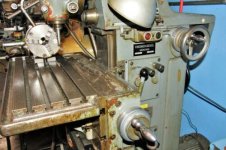I would argue with that statement!
I figure there'd have been more objections to that

.
As nice as they are (I have an Aciera F1, and came close to pulling the trigger on a Deckel recently ....I do like them a lot ), imo, if an expensive mechanism becomes trash when a wear part wears, is a very poor design. Its not like its the Mars rover where there's no other way to achieve the goal except to make it sacrificial. A few mm more would have allowed for regular AC's and permitted replaceable bearings like every other roller element spindle design.
People oooohh and ahhh over them (me too) and I suspect that overshadows lots of unmentioned problems. One guy I was corresponding with was so proud of his....but he did finally admit his spindle was a bad as mine - several thou wear. So its about useless. I bought the one with the bad spindle, the character tried to pawn it off without mentioning it but fortunately I caught it. After some theatrics we agreed on a new deal but I underestimate what a disaster the design flaw is to recover from. Grrrr.
After pursuing lots of different options, I finally decided to redesign and make a replacement spindle using very low profile angular contact bearings so I'll never have that problem again. I'd even thought of getting some made and see if they'd sell.
Great that there is a Singer, but really, that there is one, is kind of testament to the poor design - he's creating a niche out of the need it creates. He's a lifeline and afaik about all there is. Walk into any other spindle rebuild shop with this problem and you'll be told you're out of luck. (unlike most every other person who darkens their doorstep with spindles of reasonable design)
I spoke with engineers at a couple of bearing firms who, despite it being mentioned in the catalogue, essentially laughed at the idea of ordering a single special sized high precision cage of rollers. You could do like they did at Spar aerospace, buy a barrel of balls (or needles) and with a millionths or hundred thousands of an inch comparator sort and make your sets (I have their hundred thousands comparator), but who's go make that commitment to fix essentially obsolete (by modern production standards) old mills? Wouldn't work anyways as all in the barrel will be close to nominal not a range. So what are you left with, make your own needles? But Mr Deckel, I just want to change the worn wear part in my mill!
Out of curiosity, do you have any sense what a Singer spindle cost? Thanks.




 .
.